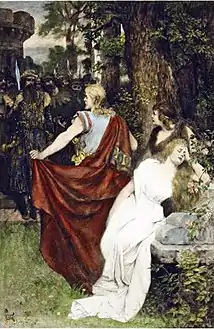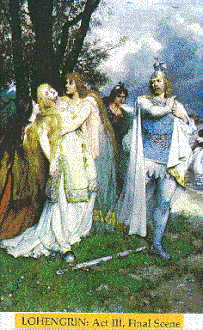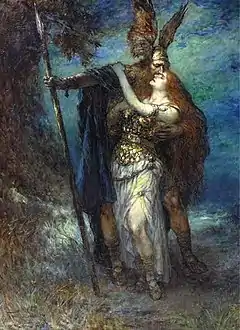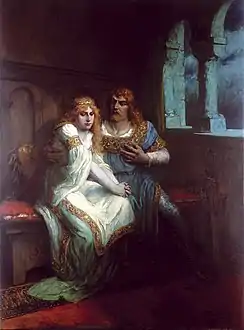Ferdinand Leeke (7 April 1859 – 1923) was a German Painter, famous for his depictions of scenes from Wagnerian Operas.[1] A native of Burg bei Magdeburg, Germany, he studied at the Munich Academy under Ludwig von Herterich (1843–1905) and Sándor Liezen-Mayer, a genre and historical painter, and with Alexander von Wagner (1838–1919), a Hungarian genre and landscape painter.[2]
Around 1889, Siegfried Wagner, the son of the composer Richard Wagner, commissioned Leeke to paint a series of paintings showing scenes from ten operas by Wagner.[3]
Wagner Pictures
- Rienzi: Act IV, Scene II
- The Flying Dutchman: Act III, Finale
- Tannhauser: Act III, Scene I.
- Lohengrin: Act III, Finale
- The Rheingold: Scene II
- The Valkyrie: Act I.
- Siegfried: Act II
- Götterdämmerung: Act III
- Tristan and Isolde: Act II
- The Mastersingers of Nuremberg: Act III
Gallery
 The Mermaid and the Satyr (1917)
The Mermaid and the Satyr (1917)

 Wotan and Brünnhilde (1930)
Wotan and Brünnhilde (1930) Lohengrin (1916)
Lohengrin (1916)
References
- ↑ Horizon, vol 23, p242
- ↑ "19th Century Paintings - Ferdinand Leeke - Dorotheum". www.dorotheum.com. Archived from the original on 2018-07-03. Retrieved 2018-03-26.
- ↑ "Ferdinand Leeke". Wagner's Ring. 4 June 2016.
External links
Wikimedia Commons has media related to Ferdinand Leeke.
This article is issued from Wikipedia. The text is licensed under Creative Commons - Attribution - Sharealike. Additional terms may apply for the media files.